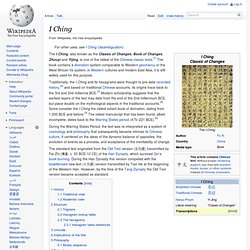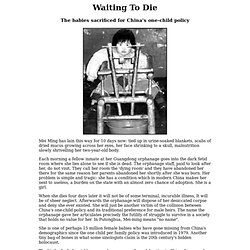

I Ching. The I Ching, also known as the Classic of Changes, Book of Changes, Zhouyi and Yijing, is one of the oldest of the Chinese classic texts.[1] The book contains a divination system comparable to Western geomancy or the West African Ifá system; in Western cultures and modern East Asia, it is still widely used for this purpose.

Traditionally, the I Ching and its hexagrams were thought to pre-date recorded history,[2] and based on traditional Chinese accounts, its origins trace back to the 3rd and 2nd millennia BCE.[3] Modern scholarship suggests that the earliest layers of the text may date from the end of the 2nd millennium BCE, but place doubts on the mythological aspects in the traditional accounts.[4] Some consider the I Ching the oldest extant book of divination, dating from 1,000 BCE and before.[5] The oldest manuscript that has been found, albeit incomplete, dates back to the Warring States period (475–221 BCE).[6] History[edit] Traditional view[edit] Modernist view[edit] Structure[edit]
RIVERSIDEWONGS.NET. Its a girl! The babies sacrificed for China's one-child policy Mei Ming has lain this way for 10 days now: tied up in urine-soaked blankets, scabs of dried mucus growing across her eyes, her face shrinking to a skull, malnutrition slowly shrivelling her two-year-old body.

Each morning a fellow inmate at her Guangdong orphanage goes into the dark fetid room where she lies alone to see if she is dead. The orphanage staff, paid to look after her, do not visit. They call her room the 'dying room' and they have abandoned her there for the same reason her parents abandoned her shortly after she was born. Her problem is simple and tragic: she has a condition which in modern China makes her next to useless, a burden on the state with an almost zero chance of adoption. When she dies four days later it will not be of some terminal, incurable illness, It will be of sheer neglect.
The birth of a baby girl has never been a cause for celebration in China. Sixty-Four Percent of Ch. China Netease, one of China's most popular Internet portals, held a survey on the subject "If there were a next life, would you like to be a Chinese.

" 64 percent of Internet surfers answered that they "would not like to be a Chinese again next life. " The survey sparked vigourous discussions, but now the web page has been shut down. 10,234 people participated in the Netease survey, which ran from September 4 to September 10. Sixty-four percent of those surveyed "would not like to be a Chinese again next life. " The survey was scheduled to run until October 11, but the web page was closed prematurely, the web survey page, became unavailable ahead of the closing date. Apple Daily reported that Netease news channel editor Tang Yan and commentary channel editor Liu Xianghui were abruptly dismissed on September 16, without any explanation, but outsiders believe it is related to the web survey.
SKIN DEEP: Dying to be white - M.